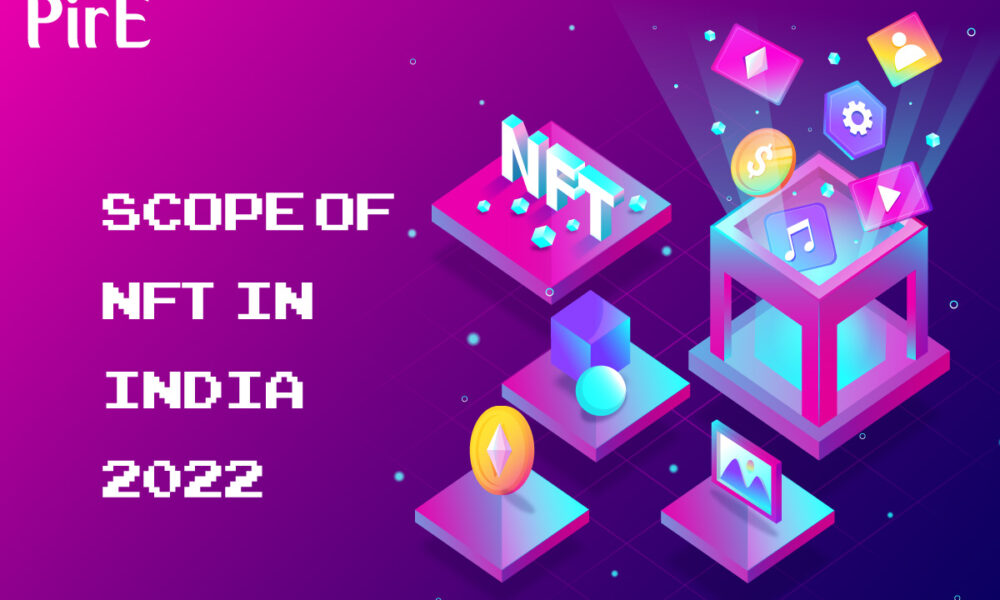Scope of NFT in India 2022
A non-fungible token (NFT) is a non-transferable unit of data that may be sold and exchanged and is held on a blockchain, a type of digital ledger. Digital media such as photographs, movies, and music may be connected with several types of NFT data units. NFTs vary from blockchain cryptocurrencies like Bitcoin in that each token is uniquely recognized.
Although NFT ledgers purport to give a public certificate of authenticity or proof of ownership, the legal rights that an NFT conveys might be ambiguous. NFTs do not block the production of NFTs with identical related files, nor do they restrict the sharing or copying of the underlying digital data. They also do not impart the copyright of the digital files.
Lets now see the Pros and Cons of NFT
Pros
- They can be used to fractionalize physical asset ownership.
Fractionalizing ownership of some assets, such as real estate, artwork, and expensive jewellery, is challenging today. A computerised replica of a structure is considerably easier to split among several owners than an actual one. The same may be said for a valuable piece of jewellery or a limited-edition bottle of wine.
The market for some assets can be considerably extended by digitalization, resulting in more liquidity and higher pricing. It can improve the way financial portfolios are built on an individual basis, allowing for more diversification and more precise position size.
- NFTs’ Blockchain Technology Is Extremely Safe
NFTs are made with blockchain technology, which is a method of storing data that is hard to hack, change, or destroy. A blockchain is essentially a digital record of transactions that is copied and distributed throughout a peer-to-peer network of users.
All NFTs kept on the blockchain contain unique records of authenticity and chain-of-ownership, preventing them from being mishandled or stolen in theory. Data can’t be edited or removed after it’s been added to the chain. This ensures that each NFT’s scarcity and authenticity are preserved, fostering a level of trust uncommon in many markets.
Cons
- NFTs can harm the environment
It takes a lot of computational power to build blockchain records, and there’s a lot of talk about how bad the process is for the environment in the long run. According to some projections, the carbon emissions related with mining cryptocurrencies and NFTs would exceed those associated with the entire city if current trends continue. NFTs revolutionise global marketplaces, eliminating the need for travel and office space consumption, blockchain supporters say that an offsetting drop in pollution is happening.
- NFTs are volatile and illiquid.
The market for NFTs is not particularly liquid due to their immaturity. NFTs aren’t well-understood, and there aren’t many potential buyers or sellers. As a result, NFTs can be extremely difficult to trade, particularly during times of stress. As a result, NFT pricing can be quite variable.
- NFTs don’t bring in any money.
NFTs, unlike dividend-paying equities, interest-bearing bonds, and rent-generating real estate, do not provide income to their owners. The rewards on NFT investments, like those on antiques and other collectables, are totally dependent on price appreciation, which is not something you should bank on.
NFT’s Future
NFTs are a fascinating invention that is gaining a lot of attention as its applications grow. The attention-getting price tags on certain NFTs are adding fuel to the flames. However, because NFTs are very illiquid and volatile, smart investors should proceed with caution when considering purchasing these assets.
It’s not a good idea to buy them in the hopes of getting triple- or quadruple-digit price returns. The true value of NFTs rests in their ability to change the way markets work and improve how we handle and regulate critical data. The sky is the limit here.

